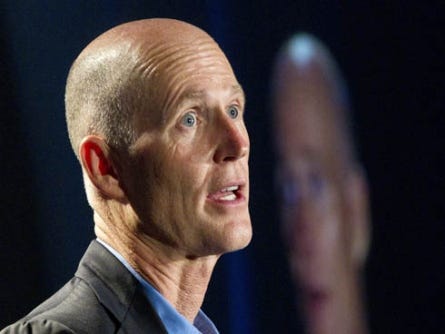
TALLAHASSEE, Fla. (AP) — A law championed by Gov. Rick Scott that requires teachers, state and county workers and some municipal employees to contribute 3 percent of their pay to the state's pension plan was narrowly upheld by the Florida Supreme Court on Thursday.
The 4-3 decision reversed a trial judge's ruling that the law violated the collective bargaining, contract and property rights of about 600,000 public employees including police, firefighters and other first-responders.
The law, which went into effect on July 1, 2011, also repealed 3 percent annual cost of living increases for benefits accrued after that date.
The ruling was vindication for the Republican governor — who had sought an even bigger 5 percent employee contribution — and the GOP-controlled Legislature. The decision was a bitter defeat for public employee unions, led by the Florida Education Association, which had challenged the law.
"The court's ruling today supports our efforts to lower the cost of living for Florida families," Scott said in a statement. "This means even more businesses will locate and grow in our state."
Scott argued it was unfair that Florida's public employees didn't contribute because workers in most other states and the private sector are required to help pay for their pensions if they still have that benefit.
The public employees' contributions, though, were not used to strengthen the Florida Retirement System, already one of the nation's strongest pension plans. Instead, they reduced contributions made by state and local government employers.
"Balancing the state budget on the backs of middle-class working families is the wrong approach," teachers union president Andy Ford said in a statement.
A ruling against the contribution law would have created a nearly $2 billion budget gap for state and local governments because they then would have had to return the employee contributions.
"We still believe that a promise is a promise," Ford said. "We are more determined than ever to change the face of the Florida Legislature. The next elections in 2014 can turn this decision around."
Although Democrats, who are closely allied with the unions, picked up a few seats in the Legislature last year, Republicans continue to hold large majorities in both chambers.
"The changes made to the Florida Retirement System reflect the Legislature's efforts to maintain a sound retirement system for our hardworking state and local government employees as well as the reality that Florida taxpayers can no longer bear the full cost of this benefit," said Senate President Don Gaetz, R-Niceville.
A key legal issue was how to interpret a law passed in 1974 that declares the retirement rights of public employees are contractual in nature. That year, the Legislature, then led by Democrats, also eliminated employee contributions to the pension plan.
The high court majority cited a 1981 Supreme Court opinion that said the law protected rights and benefits already earned but did not preclude the Legislature from altering benefits prospectively for future service.
Justice Jorge Labarga wrote for the majority that the same principle applied to the new law that restored employee contributions, so it does not violate employees' contract rights nor take away property in the form of their pension benefits.
The new law also doesn't violate collective bargaining rights guaranteed by the Florida Constitution for public and private employees because it doesn't prohibit such negotiations between unions and employers, Labarga wrote.
"Although I understand the frustration of state employees, who have in effect taken a 3 percent pay cut in addition to years without cost-of-living adjustments, this case is not about the wisdom or fairness of the Legislature's decision," Justice Barbara Pariente wrote in a concurring opinion.
Labarga and Pariente were joined by Chief Justice Ricky Polston and Justice Charles Canady, the high court's two most reliably conservative members.
In a dissent, Justice James Perry argued the 1981 ruling was wrong and the high court should have receded from it. Justices R. Fred Lewis and Peggy Quince concurred with Perry.
"The retirement benefits protected by contract, as established by the Legislature, were simply taken from our first responders, those who protect us, those who teach and protect our children and others who have provided us services every day, to be used for other purposes," Lewis wrote in a separate dissent.
Un-rebutted expert testimony shows the law will cost each public employee from $12,446 to $329,684 over the span of their working years, Lewis noted. He pointed out the employee contributions, meanwhile, saved the state $861 million in the 2011-12 budget. That's money the state didn't need because the budget also included $1.2 billion in unspent general revenue, he contended.
Lewis wrote that the law also effectively, although not explicitly, impaired collective bargaining rights because "the Legislature has unilaterally predetermined the term or condition (of employment) through statute, rendering any subsequent negotiations futile."
This article originally appeared on Crestview News Bulletin: Florida court upholds pension law repealing cost of living increase
